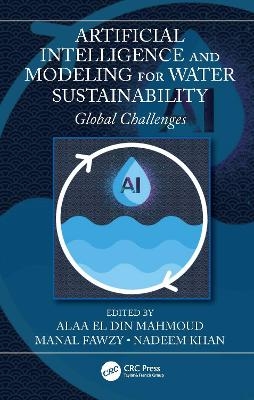
Artificial Intelligence and Modeling for Water Sustainability
Global Challenges
Seiten
2024
CRC Press (Verlag)
978-1-032-19707-4 (ISBN)
CRC Press (Verlag)
978-1-032-19707-4 (ISBN)
- Lieferbar (Termin unbekannt)
- Versandkostenfrei
- Auch auf Rechnung
- Artikel merken
Written by experts in academia and industry Artificial Intelligence and Modeling for Water Sustainability: Global Challenges helps governments, industries, and homeowners address water pollution problems more quickly and efficiently, and gain better insight into the implementation of more effective remedial measures.
Artificial intelligence and the use of computational methods to extract information from data are providing adequate tools to monitor and predict water pollutants and water quality issues faster and more accurately. Smart sensors and machine learning models help detect and monitor dispersion and leakage of pollutants before they reach groundwater. With contributions from experts in academia and industries, who give a unified treatment of AI methods and their applications in water science, this book help governments, industries, and homeowners not only address water pollution problems more quickly and efficiently, but also gain better insight into the implementation of more effective remedial measures.
FEATURES
Provides cutting-edge AI applications in water sector.
Highlights the environmental models used by experts in different countries.
Discusses various types of models using AI and its tools for achieving sustainable development in water and groundwater.
Includes case studies and recent research directions for environmental issues in water sector.
Addresses future aspects and innovation in AI field related to watersustainability.
This book will appeal to scientists, researchers, and undergraduate and graduate students majoring in environmental or computer science and industry professionals in water science and engineering, environmental management, and governmental sectors. It showcases artificial intelligence applications in detecting environmental issues, with an emphasis on the mitigation and conservation of water and underground resources.
Artificial intelligence and the use of computational methods to extract information from data are providing adequate tools to monitor and predict water pollutants and water quality issues faster and more accurately. Smart sensors and machine learning models help detect and monitor dispersion and leakage of pollutants before they reach groundwater. With contributions from experts in academia and industries, who give a unified treatment of AI methods and their applications in water science, this book help governments, industries, and homeowners not only address water pollution problems more quickly and efficiently, but also gain better insight into the implementation of more effective remedial measures.
FEATURES
Provides cutting-edge AI applications in water sector.
Highlights the environmental models used by experts in different countries.
Discusses various types of models using AI and its tools for achieving sustainable development in water and groundwater.
Includes case studies and recent research directions for environmental issues in water sector.
Addresses future aspects and innovation in AI field related to watersustainability.
This book will appeal to scientists, researchers, and undergraduate and graduate students majoring in environmental or computer science and industry professionals in water science and engineering, environmental management, and governmental sectors. It showcases artificial intelligence applications in detecting environmental issues, with an emphasis on the mitigation and conservation of water and underground resources.
Alaa El Din Mahmoud, Manal Fawzy, Nadeem Ahmad Khan
Introduction. Environmental Models for Sustainable Development. Role of Artificial Intelligence in Water Sector: Dependency on Automation Systems. Modeling and Prediction of Water Security Connected to Global Challenges. Simulation Models of Threatened Aquatic Ecosystems. Monitoring of Contaminants in Aquatic Ecosystems using Big Data. Mitigation of Water Shortage Issues: Water 4.0. Water Pollution Monitoring Using Artificial Intelligent: Basic Algorithm Design. Neural Networks in Wastewater Treatment Process. Circular Economy Models in Water and Wastewater. Integrated Water Resources Management: Perspectives and Challenges. Hydrological Modeling for Sustainable Groundwater Resources.
| Erscheinungsdatum | 12.12.2023 |
|---|---|
| Zusatzinfo | 27 Tables, black and white; 11 Line drawings, color; 21 Line drawings, black and white; 19 Halftones, color; 15 Halftones, black and white; 30 Illustrations, color; 36 Illustrations, black and white |
| Verlagsort | London |
| Sprache | englisch |
| Maße | 156 x 234 mm |
| Gewicht | 453 g |
| Themenwelt | Informatik ► Theorie / Studium ► Künstliche Intelligenz / Robotik |
| Naturwissenschaften ► Geowissenschaften ► Hydrologie / Ozeanografie | |
| Technik ► Umwelttechnik / Biotechnologie | |
| ISBN-10 | 1-032-19707-2 / 1032197072 |
| ISBN-13 | 978-1-032-19707-4 / 9781032197074 |
| Zustand | Neuware |
| Informationen gemäß Produktsicherheitsverordnung (GPSR) | |
| Haben Sie eine Frage zum Produkt? |
Mehr entdecken
aus dem Bereich
aus dem Bereich
Buch | Softcover (2024)
REDLINE (Verlag)
CHF 27,95
was sie kann & was uns erwartet
Buch | Softcover (2023)
C.H.Beck (Verlag)
CHF 25,20


